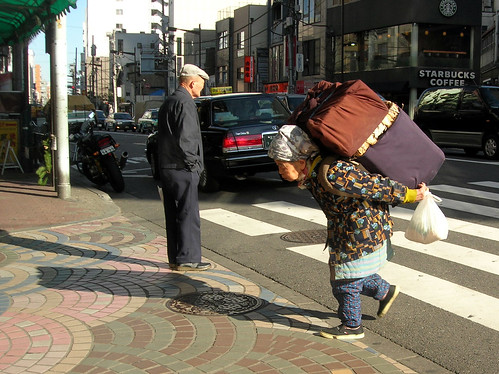
Tuesday in the 2nd Week of Lent
Lightening Loads
Readings: Isaiah 1:10, 16-20; Psalm 50:8-9, 16bc-17, 21 and 23; Matthew 23:1-12
We began Mass today with a prayer for ourselves as members of the Church. We asked the Lord to protect us from what could harm us and lead us to what could save us. And our readings today help us to focus our attention and reflection precisely on the contrast between these two groups of things: those that could harm and those that could save us.
The first reading marks the theoretical boundaries between these two groups quite clearly: cease to do evil; learn to do good. But we ourselves know well that, in practice, the boundaries are often as clear as mud. However much theoretical knowledge we may think we have, we also know how difficult it can be to translate theory into practice, to connect Law with Life. Isn’t this why Jesus is so hard on the scribes and the Pharisees in the gospel? For they are able to make things sound so easy, probably because they don’t try very hard themselves. They preach but they do not practice… Theirs is a religion that ties up heavy burdens hard to carry and lays them on people’s shoulders.
Of course, in a sense, the scribes and Pharisees do try hard, indeed, much harder than others. But their efforts are primarily directed towards keeping up the appearance of meticulous ritual observance for the sake of being honored in the sight of others. This kind of empty religion contrasts quite starkly with what Jesus represents. The former lays burdens, while the latter liberates. The first delights only in telling you what to do. The second actually cares enough to help you to do it. For Jesus follows in the line of the prophets, who insist on the need for religious observance to be matched by works of mercy. Make justice your aim: redress the wronged, hear the orphan’s plea, defend the widow. Although this may sound to us like just another heavy burden being laid on our tired shoulders, it is rather a liberating truth.
For Jesus helps us to show mercy to others, by first showing mercy to us. Jesus helps us to lighten the load of others -- the wronged and orphans and widows of our day -- by lightening our own. Jesus frees us from the burden of sin so that we might in turn reach out to help others. Here, at last, is the teaching that saves. Here, at last, is the religion that removes burdens. Here, at last, is the way to life.
Which is why it’s perhaps appropriate to end our reflection the way we started, by recalling our opening prayer. In that earnest appeal to the Lord for help, we acknowledged that without you we are bound to fail. And isn’t this also the disposition that we are trying to cultivate in these Forty Days? Through our Lenten discipline, we are seeking to humble ourselves in the hope that the Lord might raise us up, and help us to raise others.
How is the Lord lightening our load and inviting us to do the same for others today?
In lay parlance it is very difficult to walk our talk. Talk is cheap but let our actions do the walking. There are two ways we forge ahead in life: push others around us down in order to stand out alone OR to stretch out our hands and pull each up so we stand up together. When we falter, there is that One hand always there to lift us. He will lighten our load.
ReplyDeleteWithout sounding self-righteous, I never fail to be amazed by the empty practise of our religion. Here's an example. In my parish, the parish priest has been trying (for months) to enlist car park wardens to maintain some semblance of civility during the weekends. This is a church car park mind you, not a shopping mall's. Needless to say, no one volunteered. I often wonder what goes on in the minds of those who park inconsiderately when they arrive for Mass?
ReplyDeleteI recall yesterday's reflection on 'zoom in, zoom out', 'yin and yang', 'religiosity versus faith'. Yes, there are those attitudes and actions of ours that can harm and those that can liberate (save). Those that liberate are almost always directed at the well-being of others.
To parody Shakespeare's oft-cited assertion about greatness: Some are born burdened, some acquire burdens, others have burdens thrust upon them. I pray that I may never find myself in categories two and three.